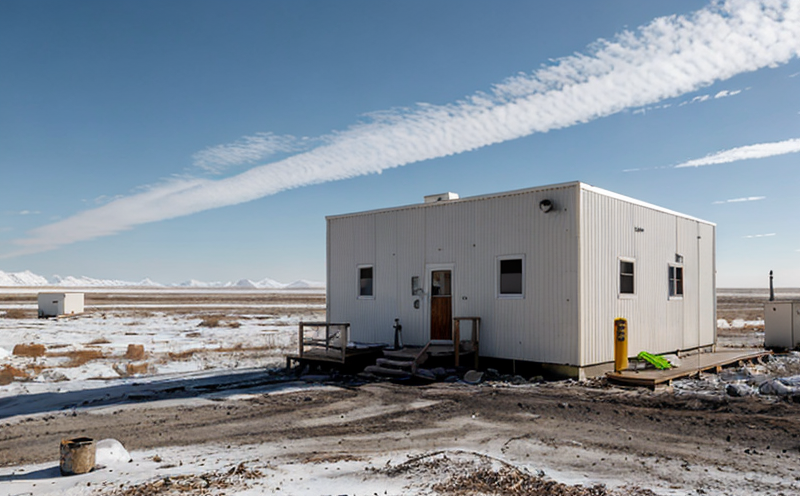MIL-STD-461 RS103 Radiated Susceptibility under Harsh EMC Testing
The MIL-STD-461 RS103 standard is a critical requirement for semiconductor and microchip manufacturers to ensure that their products can withstand the electromagnetic interference (EMI) and radio frequency interference (RFI) environments encountered in military, aerospace, and other high-reliability applications. This testing ensures that electronic components do not only function correctly but also remain robust under challenging environmental conditions.
The standard is particularly important for defense and space industries where equipment must operate reliably in harsh environments such as electromagnetic storms, solar flares, or dense urban electromagnetic fields. The test evaluates the ability of semiconductor and microchip assemblies to maintain their performance when exposed to radiated interference that can degrade signal integrity and cause malfunctions.
The RS103 tests are conducted under controlled conditions using a range of frequencies from 1 MHz up to 40 GHz, depending on the specific requirements set by the MIL-STD-461. This comprehensive testing ensures that devices can withstand both man-made and natural electromagnetic interference, thereby enhancing system reliability and safety.
The process involves placing the device under test (DUT) in a controlled environment where it is exposed to various levels of radiated signals. The test setup includes an anechoic chamber equipped with a signal generator, antennas, and a spectrum analyzer to measure the electromagnetic interference. The DUT is subjected to different frequency bands and power levels to simulate real-world conditions.
The testing process aims to identify potential weaknesses in the design that could lead to failures or malfunctions under harsh environmental conditions. By subjecting the device to these tests early in the development cycle, manufacturers can address any issues before mass production, ensuring higher quality and reliability of end products.
Understanding the importance of this test is crucial for companies operating in sectors like defense, aerospace, and other high-reliability industries where product failure could lead to severe consequences. The ability to pass these tests not only ensures compliance with military standards but also enhances brand reputation and market competitiveness by demonstrating a commitment to quality and reliability.
The MIL-STD-461 RS103 testing is essential for ensuring that semiconductor and microchip products can function reliably in the most challenging environments. By adhering to this standard, manufacturers can meet regulatory requirements and improve product performance and durability. This testing process plays a vital role in maintaining the integrity of electronic systems across various applications.
Why It Matters
The importance of MIL-STD-461 RS103 testing cannot be overstated, especially for industries where product reliability and performance are paramount. The harsh electromagnetic environments encountered by military and aerospace equipment can lead to significant operational disruptions if not properly addressed.
- Enhanced Reliability: Ensures that semiconductor and microchip assemblies continue to function correctly under extreme conditions.
- Compliance with Standards: Meeting MIL-STD-461 RS103 requirements is essential for compliance with international standards, thereby ensuring product acceptance in the market.
- Safety and Performance: Ensures that electronic devices operate safely and effectively in challenging environments, reducing the risk of failures or malfunctions.
- Competitive Advantage: Demonstrates a commitment to quality and reliability, which can enhance brand reputation and market competitiveness.
The ability to pass these tests is crucial for maintaining product integrity and ensuring that devices operate reliably under extreme conditions. This testing process plays a vital role in maintaining the performance of electronic systems across various applications.
Scope and Methodology
| Test Parameters | Description |
|---|---|
| Frequency Range | 1 MHz to 40 GHz, depending on the specific requirements set by MIL-STD-461. |
| Power Levels | Varies based on the frequency and type of interference being tested. |
| Environmental Conditions | Includes controlled temperature and humidity levels to simulate real-world conditions. |
| Test Duration | Varies depending on the complexity of the device under test (DUT). |
The testing process involves placing the DUT in a controlled environment where it is exposed to various levels of radiated signals. The anechoic chamber equipped with signal generators, antennas, and spectrum analyzers ensures accurate measurement of electromagnetic interference.
After exposure to the specified frequencies and power levels, the test results are analyzed to determine compliance with MIL-STD-461 RS103 standards. Any failures or issues identified during testing provide valuable insights into potential design improvements for future iterations of the product.
Competitive Advantage and Market Impact
- Enhanced Reliability: Ensures that semiconductor and microchip assemblies continue to function correctly under extreme conditions, leading to higher customer satisfaction.
- Compliance with Standards: Meeting MIL-STD-461 RS103 requirements ensures product acceptance in the market, thereby enhancing brand reputation.
- Safety and Performance: Ensures that electronic devices operate safely and effectively in challenging environments, reducing the risk of failures or malfunctions.
- Competitive Advantage: Demonstrates a commitment to quality and reliability, which can enhance market competitiveness by differentiating products from competitors.
The ability to pass these tests is crucial for maintaining product integrity and ensuring that devices operate reliably under extreme conditions. This testing process plays a vital role in maintaining the performance of electronic systems across various applications.





